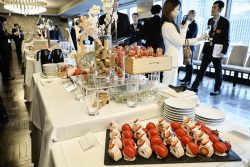Young People Boost Once-Stagnant Perfume Sales in Japan; Interest Grow Amid Isolation, Tension of COVID Pandemic

Women shop for perfume at the Matsuya Ginza department store in Chuo Ward, Tokyo.
11:30 JST, August 8, 2024
Young people are driving a boom in the fragrance and perfume market in Japan, a country once known as a “desert for perfumes.” Aiming to draw in customers, department stores are expanding their sales floors and manufacturers have launched new services.
Department stores
Young women picked up bottles one after another in late June at the Matsuya Ginza department store in Chuo Ward, Tokyo. In addition to popular items such as luxury foreign perfumes, the products on display included unique scents inspired by foods like tomatoes and basil.
“Many young customers buy fragrances as a way to express their personalities,” an official from the department store said. The store deliberately stocks perfumes that are not too strong.
Matsuya Ginza doubled the size of its perfume sales floor in the summer of 2022. Sales from foreign tourists have had a significant impact, but revenue excluding duty-free sales grew by 18% year-on-year this June. In addition, about 40% of the customers who come to the perfume area are men.
Isetan Shinjuku store increased the size of its sales floor for perfumes by 50% last autumn, and sales doubled in May from the same month the year before.
According to private research company Fuji Keizai Group Co., the size of the domestic perfume market is predicted to hit ¥54.7 billion in 2024, up more than 30% from 2020, and more growth is expected in the future.
Targeting beginners
Cosmetics are usually informed by the culture and lifestyle of a country or region. In Japan, there is a resistance to strong smells, as expressed by the term “scent pollution.” Consequently, domestic perfume sales were sluggish for many years.
However, during the COVID-19 outbreak, more and more people experimented with fragrances to try something new or feel relaxed as they spent more time at home. An increasing number of young people now own and wear several different perfumes as part of their personal style.
According to a survey by marketing institute Shibuya109 lab., keywords related to scents ranked highly among the trends of 2023. “Influencers promote the appeal of fragrances and perfumes on social media, prompting young people to use them to express themselves,” said researcher Makiko Tanabe.
Manufacturers are capitalizing on the trend to expand their customer base. Pola Orbis Holdings Inc. has launched a perfume subscription service called “Eram” — after filling out an online questionnaire, subscribers receive a perfume matched to their taste every month.
To attract newcomers, Kose Corp. sells mini perfumes under its luxury brand Decorte, each bottle containing 15 milliliters and priced affordably at ¥3,520. “We want to convey our brand image by letting people experiencing scents,” an official at the company said.
Top Articles in Business
-

Prudential Life Insurance Plans to Fully Compensate for Damages Caused by Fraudulent Actions Without Waiting for Third-Party Committee Review
-

Japan, U.S. Name 3 Inaugural Investment Projects; Reached Agreement After Considerable Difficulty
-

Japan’s Major Real Estate Firms Expanding Overseas Businesses to Secure Future Growth, Focusing on Europe, U.S., Asia
-

SoftBank Launches AI Service for Call Centers That Converts Harsh Customer Voices into Softer Voices
-

Transport Companies See Opportunity in Narita Expansion; Airlines, Railways Prepare to Meet Expected Growth in Demand
JN ACCESS RANKING
-

Producer Behind Pop Group XG Arrested for Cocaine Possession
-

Japan PM Takaichi’s Cabinet Resigns en Masse
-

Man Infected with Measles Reportedly Dined at Restaurant in Tokyo Station
-

Israeli Ambassador to Japan Speaks about Japan’s Role in the Reconstruction of Gaza
-

Videos Plagiarized, Reposted with False Subtitles Claiming ‘Ryukyu Belongs to China’; Anti-China False Information Also Posted in Japan
























